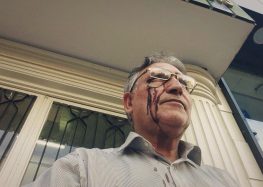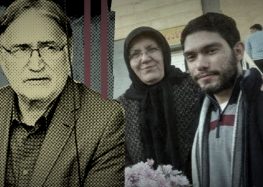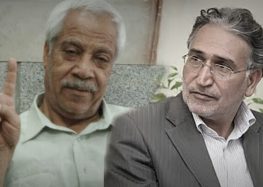Revolutionary Guard Confiscated Confidential Footage to Fabricate Film, Says Nourizad
 Following the release of a private and confidential film about his personal life, renowned filmmaker and journalist Mohammad Nourizad spoke with the International Campaign for Human Rights in Iran about the illegality of its release.
Following the release of a private and confidential film about his personal life, renowned filmmaker and journalist Mohammad Nourizad spoke with the International Campaign for Human Rights in Iran about the illegality of its release.
Nourizad told the Campaign that security and intelligence officials confiscated personal footage and films from his home during his arrest, and used it to create a video. This video appeared on YouTube on 10 December.
“This is stolen footage from a confidential film. They can use the materials of the film to build a case against me as a spy and a traitor but it is not permissible to take my personal computer and use my family photos and videos against me. I am not speaking from a religious point of view but from a societal and legal perspective. This is part of the most essential ethical and legal rights of human beings.”
Nourizad said he would file a complaint against the Intelligence Office of the Revolutionary Guard, whom he implicated in the theft and fabrication of the video.
“They [the Revolutionary Guards] were the ones who confiscated my filming equipment and used my private recordings. I was in the backyard shooting when ten people broke into my father’s house. They confiscated my camera and equipment while eight of them went inside the house and seized my belongings.”
The YouTube video showed Nourizad’s personal photos and videos, including previous footage of him praising the Supreme Leader, taken from when he was still working for the publication Kayhan.
Nourizad told the Campaign that his son, Abouzar Nourizad, was his assistant in the shooting of the film and left Iran upon its completion. By distorting the content of the film, Nourizad said, “they are trying to convey that my son, who had assisted me in the making of the film, is a fugitive and has escaped the country.”
Nourizad said he had been in the process of making a confidential film for the Supreme Leader, which was clearly mentioned in all of the recorded footage.
“What you have seen in [that] video was a movie set I built in my parent’s house. I stayed there for eighty days, which gave me enough time to make the set for the film. I undertook the making of this film without releasing any information about it. In other words this was a confidential project.”
During the past few years, security and intelligence forces have used home videos, personal photos, and falsely edited videos of detainees’ interrogations in order to ruin their reputation and image, even after their release from prison.
“In my film I talked about my anguish in solitary confinement. The Revolutionary Guards distorted the movie to destroy my image by claiming that because I used to write such articles [in support of the Supreme Leader] I have changed my position.,” added Nourizad.
“I would have accepted their accusations If they had arrested me while spying or recorded my video while communicating with their enemies; but I was making a film about my time in prison for the Supreme Leader in my father’s backyard.”
Nourizad told the Campaign that he will definitely go to court and complain. “Even though my complaints will be the subject of their laughter I will still do what I have to do.”
The video depicted Nourizad in a poor emotional and mental health. When asked about his condition at that time, Nourizad said:
“Prisoners always suffer from Illness and depression specially when they are kept in solitary confinement for a long period of time. I was in solitary confinement for more than sixty days and naturally this period caused extreme depression but I tried to keep my mental health by exercising.”
Nourizad believes that security officials will further edit and release inaccurate material from the large amount of footage that they had confiscated.
“In the film, there were scenes in which I talked directly to the camera. There was plenty of other material on my personal computer which were used and edited into a series of which the released video is probably the first part.”
In the past few months, Nourizad has written numerous letters about the horrible prison conditions to the Supreme Leader.
When was asked if he would continue to write letters to the Supreme Leader, he replied: “I certainly will continue writing my letters, I will write my weekly letters until the presidential elections.”



